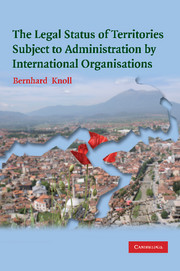Book contents
- Frontmatter
- Contents
- Illustrations
- Foreword: Pierre-Marie Dupuy
- Acknowledgements
- Table of Cases and Judicial Decisions
- List of Abbreviations
- Introduction
- 1 Creation of internationalised territories
- 2 Fiduciary administration: mandates, trust and the transitory sovereignty vacuum
- 3 Self-determination and the personality of internationalised territories
- 4 ‘The King's two bodies’: the dual functions of international administrations
- 5 Extent of UN authority in Kosovo and the problem of an open-ended institution-building mandate
- 6 The status process: Kosovo's endgame
- 7 An anomalous legitimacy cycle
- 8 Properties of a transitory legal order
- Concluding appraisal
- Bibliography
- Index
7 - An anomalous legitimacy cycle
Published online by Cambridge University Press: 11 August 2009
- Frontmatter
- Contents
- Illustrations
- Foreword: Pierre-Marie Dupuy
- Acknowledgements
- Table of Cases and Judicial Decisions
- List of Abbreviations
- Introduction
- 1 Creation of internationalised territories
- 2 Fiduciary administration: mandates, trust and the transitory sovereignty vacuum
- 3 Self-determination and the personality of internationalised territories
- 4 ‘The King's two bodies’: the dual functions of international administrations
- 5 Extent of UN authority in Kosovo and the problem of an open-ended institution-building mandate
- 6 The status process: Kosovo's endgame
- 7 An anomalous legitimacy cycle
- 8 Properties of a transitory legal order
- Concluding appraisal
- Bibliography
- Index
Summary
The creation of geographical exceptions … is a dangerous enterprise. Anomalous zones may become, quite literally, sites of contestation of the polity's fundamental values.
The long-winded attempts to find a multilateral solution for Kosovo's microcosm demonstrated that an impasse on the international negotiation plane regularly led to an institutional deadlock and the slowing down of reforms and standards implementation at the local level. The task of an international administration in managing an open-ended situation became more complex; its legitimacy in the eyes of the people it administers waned accordingly. Given the scope of authority the UN has taken upon itself to exercise in a territorial context, it is, however, surprising that the issue of the ‘legitimacy’ of the internationalisation of state structures through international post-conflict governance has so far inspired little debate beyond the old peacekeeping discourse. This chapter and chapter 8 hence turn ‘inwards’ in an attempt to define more succinctly the properties of a temporary coercive order established by an international territorial administration. Both are generally concerned with phenomena accompanying an international legal and political authority as it ‘meets’, and interlaces with, a municipal legal and political order.
Upon consideration, the metaphor of ‘encounter’ is not at all ill conceived.
- Type
- Chapter
- Information
- The Legal Status of Territories Subject to Administration by International Organisations , pp. 288 - 325Publisher: Cambridge University PressPrint publication year: 2008

